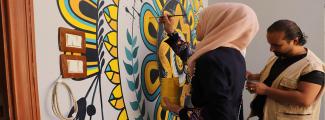Rural Damascus
Thu, 10/31/2019 - 09:47
Merging Activity: Your Festival is Our Festival – al-Hameh, Rural Damascus
Thu, 10/31/2019 - 09:19
“Vital Signs, Temperature” Session – al-Hameh, Rural Damascus
Sat, 10/26/2019 - 09:33
Activity: International Women’s Day – al-Nabk, Rural Damascus
Sat, 10/26/2019 - 09:31
Awareness Campaign: Your Life, Your Choice! – Jaramana, Rural Damascus
Sat, 10/26/2019 - 09:28
“Story of a Lifetime” Event – al-Hameh, Rural Damascus
Sat, 10/26/2019 - 09:10
Vocational Training: “I’m Up for It!” Event – Qudsaya, Rural Damascus
Sat, 10/26/2019 - 08:55
Workshop: The Essence of Escorting – Damascus and Rural Damascus
Thu, 10/24/2019 - 09:39
Awareness Activity: “My Teeth are Beautiful” – Harassta, Rural Damascus
Sat, 10/19/2019 - 07:29

